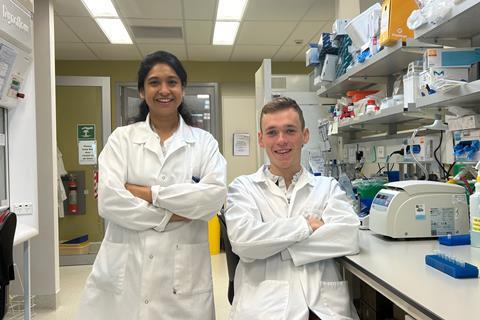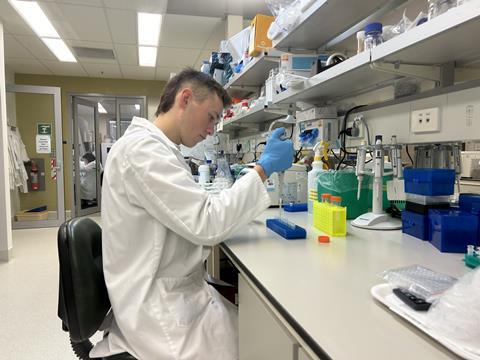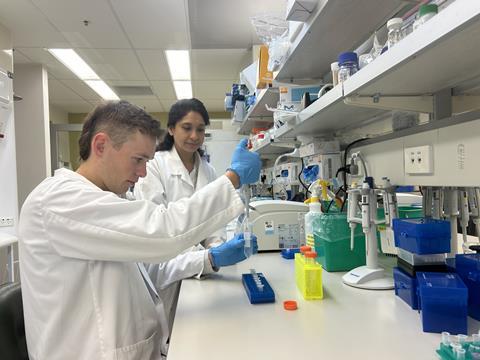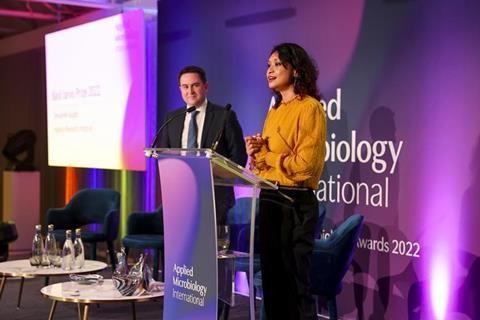2022’s winner of AMI’s Basil Jarvis Prize, Dr Tanushree Gupta of AgResearch in New Zealand, used her prize money to fund an internship investigating new antimicrobials. Intern Landry Maquet reveals how his research has been going.
My name is Landry Macquet, I am 20 years old and I come from France. I’m currently in my third year of engineering studies in Agronomy and Agro-Industry at the University of Unilasalle in Beauvais.
I am doing my internship under Dr. Tanushree Barua Gupta, my supervisor and mentor at Food System Integrity Team, Hopkirk research institute, AgResearch, Palmerston North.

Dr. Gupta is teaching me and explaining a lot about bacteria, specifically anaerobic bacteria, whole genome sequencing and growth inhibition of different bacteria. She is also helping me learn about the best way of organizing my work in the laboratory and analysing results.
Antimicrobial compounds
My research and study in finding antimicrobial compounds that can inhibit harmful bacteria focusses on two crucial UN Sustainable Development Goals (SDGs): SDG 2, which aims to “Eradicate hunger, by ensuring food security, improved nutrition and promoting sustainable agriculture by removing harsh chemicals and antibiotics from agriculture”, and SDG 12, which aims to “Ensure sustainable consumption and production patterns”. Indeed my mission is to eliminate the pathogenic bacteria present in our food and to find sustainable and ecological alternatives to eliminate these pathogenic bacteria.

I’m currently working on finding new antimicrobial compounds from anaerobic bacteria that may have inhibitory power against various spoilage, pathogenic and antibiotic resistant bacteria.
The aim of this work is to find molecules capable of eliminating pathogenic bacteria that may be present in food. We have obtained some promising results, but the work is still ongoing.
Soup of metabolites
We found that the soup of metabolites some of the anaerobic bacteria are secreting can inhibit growth of some food spoilage and pathogenic bacteria along with antibiotic resistant Pseudomonas aeruginosa.
This is important for finding a solution to chemical preservatives and alternative to antibiotics. The world needs natural preservatives and alternatives to antibiotics - hence this work is crucial as it comes from bacteria.
After this work placement, I’ll be continuing my engineering course, which is a 5-year course, and I don’t yet have any idea of what I’m going to do next.
Least favourite job in the lab?
There isn’t really any job that I like doing the least - anything to do in a laboratory is still interesting to do and enjoyable.
Having worked in a PC2 containment laboratory, handling dangerous, contagious and toxic products requires even more rigor, which is an important skill not to be neglected. So, I greatly improved my scientific rigor during this work. I also learned a lot about the way the laboratory works, the different rules and protocols to follow, but also on a scientific level where studying bacteria and how they work and produce different compounds brings new scientific knowledge.

Tanu’s support in taking the time to back me up and explain things to me when I didn’t understand, or when I couldn’t get things right, enabled me to learn from my mistakes and correct them in the best possible way, which was very informative.
Three key skills
Reflecting on and concluding the results of experiments enabled me to learn a lot more about how to conclude and write up the results of experiments. Methodology, scientific rigor and reflection were the three main skills I developed.
As far as acquiring knowledge is concerned, I was able to learn a great deal from my project and from Tanu, in terms of scientific terms, methods to be applied, protocols to be followed, as well as learning more about and becoming interested in the materials and products we work with, whether liquids, bacteria, etc.

I feel honored that Tanu used her award money to mentor me and teach me these advanced micro- and molecular skills to which I never had any exposure. I am sure the work I have done is very special and important to the world’s economy and to human health. I’m very thankful to Tanu and AgResearch.







No comments yet